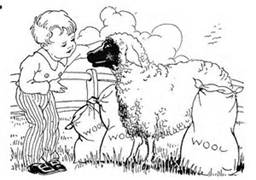
 Just about anything, in any format, can get censored or banned these days- books, television, movies, art, and music, to name a few. Now we can add classic nursery rhymes to the list of “offensive” material.
Just about anything, in any format, can get censored or banned these days- books, television, movies, art, and music, to name a few. Now we can add classic nursery rhymes to the list of “offensive” material.
The world, it seems, has completely lost its sense of reason and logic. From America to Australia, the classic songs of our childhood are being erased “for our own good and protection.”
Did you know that black sheep are now on the endangered species list? Well, in a manner of speaking, they are.
Preschool teachers are being instructed not to teach or allow children sing classic nursery rhymes. Baa Baa Black Sheep, for example, is at the top of the list because the words are considered to be racially insensitive.
Song lyrics about a sheep. Seriously. You can’t make this stuff up.
The song has been either removed altogether from day cares and classrooms or is presented with altered lyrics- kids now sing Baa Baa Rainbow Sheep.
Who ever heard of a rainbow-colored sheep, for that matter?! Black sheep are found on farms worldwide- rainbow ones just defy genetics.
Critics of the song say that the history behind the rhyme is very negative and offensive to black people because the rhyme originates from slavery, but Australian National University social psychologist Michael Platow said he doubted Baa Baa Black Sheep would teach racism to any child.
“I don’t know why a child would associate a black sheep with a black man,” he said.
Rain! Rain! has origins dating back to England in the 17th Century, but has now been given a 21st Century makeover into a “conserve water” message. No longer is it “Rain, rain, go away!” The revised lyrics are “Rain, rain, come again! We need more rain every day!” Here’s an image of an altered music sheet, courtesy of The Daily Telegraph:
 A Sydney music school changed the lyrics as a way to give its students a lesson in environmentalism. VIP Music-, which offers instrumental lessons at several schools-, said one of its teachers changed the wording to encourage water efficiency.
A Sydney music school changed the lyrics as a way to give its students a lesson in environmentalism. VIP Music-, which offers instrumental lessons at several schools-, said one of its teachers changed the wording to encourage water efficiency.
“It’s very possible to make up any wording for nursery rhymes; you don’t have to stick to the traditional nursery rhyme,” VIP music teacher Leeda Koh said.
While I understand and can even appreciate her intent, her methods are laughable, at best.
In 2011, a Montessori School was accused of “stealing Christmas” after removing all references to Santa, carols, and Christianity in year-end activities.
A primary school banned the word “gay” from old songs and carols and students were instructed to sing, “Fun your life must be”, instead.
In 2009 the Birmingham council took creative license to change the ending of Humpty Dumpty from “couldn’t put Humpty together again” to “made Humpty happy again.”
Passages have been removed from Enid Blyton books because of perceived homosexual undertones between Noddy and Big Ears, a parallel to the removal of Bert and Ernie from Sesame Street here in the United States.
Toddlers have been banned from making a “star” sign while singing Twinkle, Twinkle, Little Star for fears that the perceived rudeness of the gesture might offend the deaf.
The children were making the sign to indicate a twinkling star as they sang along, when staff asked them to use a different gesture.
A representative for the City of York Council, responsible for the Sure Start program in Acomb, York, denied it was a case of political correctness, and insisted that it was “a sensible decision taken to prevent deaf children or deaf parents from being offended.”
The “star” gesture, it seems, is very similar to the sign used for female genitalia.
The move prompted a furious response from one parent to say, “It seems a little politically correct. These are innocent little children just making a sign to show a star. No one would give it a second thought. Now every parent may worry their child may be making an offensive gesture when they’re singing this song.”
I agree. It’s called context, people. The understanding and usage of which is a vital element of language comprehension.
Nursery rhymes play an important role in developing language and literacy skills, especially with respect to alliteration, identifying syllables, and the awareness of phonetics and rhyme; but they also lose their original context and historical significance when they are altered in such a manner.
Compose a modern work if you want to draw attention to present day issues and sensibilities, but don’t defile older ones.
For more information on the Banned Books Awareness and Reading for Knowledge project and the complete list of titles covered, please visit the official website at http://bbark.deepforestproductions.com/
Sources: The Morning Bulletin, Telegraph
© 2013 R. Wolf Baldassarro/Deep Forest Productions

Leave a Reply